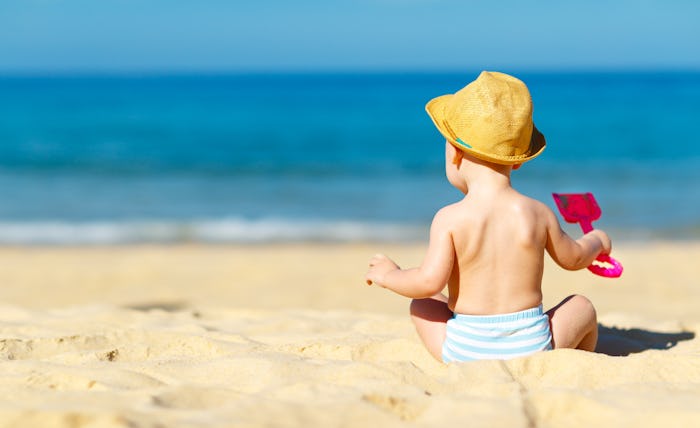Life
7 Common Dangers For Babies At The Beach That You May Not Think About
I'll admit that usually, my biggest worry at the beach is how we're going to get into the car without bringing half of the beach's sand with us. Not that I care terribly about the car getting filled with sand. But there are other, more impactful problems you should keep in mind as well, and here are some dangers for babies at the beach that you may not have thought about.
Sunburn is an obvious concern when you're going to the beach with a baby, especially when they're too young for sunscreen. However, you should keep in mind that rubbing sand in a baby's eyes, his feet getting burned on the hot sand, and contracting E. coli can be other serious dangers. The Huffington Post put together a thorough and also fairly comical roundup of dangers for beach-goers that includes falling coconuts and stingrays, but if your baby is simply hanging out on a blanket (far from coconuts and stingrays), there are other, more mundane but equally problematic concerns to take into consideration.
This isn't meant to scare you into staying home from the beach this year, but rather to help you keep in mind how to keep your baby safe when you do venture into all that sand.
1Sand In Eyes
Especially on a windy day, getting sand in a baby's eyes can be a definite danger and, in fact, KidsHealth reported that sand in the eye can cause a corneal abrasion. "Corneal abrasions can be painful, but usually heal quickly and don't cause any lasting problems," explained the site. However, they recommended having your child looked at by a doctor to ensure a corneal abrasion doesn't turn into a corneal ulcer, which is a rare possibility. To avoid it, sunglasses could help, as well as setting them up in a tent and propping them so that their back is against the wind.
2Covering Your Baby In A Blanket
It might seem like a great idea to cover your baby's stroller with a blanket when you're at the beach in order to keep her cooler, but that can actually increase the temperature in her stroller significantly, putting her at risk of overheating. What to Expect cautioned, "Avoid draping a blanket over your stroller or car seat for sun protection — even those made with breathable fabrics — as they can pose suffocation risks, increase the chance of baby overheating from poor air circulation, and prevent you from seeing your baby if she’s in distress."
3Sunscreen Irritation
Babies especially run the risk of swiping sunscreen into their eyes while playing on the beach. If this happens, Fort Worth, Texas, optometrist Kory S. Cummings suggested on All About Vision that you should flush out their eyes either with lubricating eye drops or water. Thereafter, he recommended, use "eye drops made without preservatives every hour to ease the pain. It's important to use drops that are non-preserved to ensure no additional chemicals are introduced into the already inflamed eye."
4Hot Surfaces
Dr. Curt Armstrong told ABC15 News that "sand on the beach can easily surpass 100 degrees," meaning you shouldn't put your baby directly onto the sand without testing it yourself first. "Before you put your child on that or before you walk on it yourself is just place the back of your hand on the sidewalk or on the ground," he said, and if you can hold it there for 10 seconds, your baby is safe to walk or sit on it. Otherwise, you could run the risk of your baby burning their feet or skin.
5E. coli And Other Pollutants
The water might look crystal clear, but you'll want to ensure that it's actually free of E.coli and other contaminants. To keep yourself free from E.coli and other bugs like MRSA at the beach, Live Science recommended "washing your hands frequently, especially after using the bathroom and before eating." Also, avoid swallowing water when you're swimming. For babies, make sure their head doesn't go underwater.
6Sharp Trash
Sadly, the beach isn't as clean as it once was and some beaches can have problems with trash. Even if a beach seems clean, you'll want to watch a baby that still puts things into its mouth as it plays in the sand. You never know when they're going to pick up something sharp or dangerous, like a battery or magnet, and accidentally swallow it.
7Boardwalk Splinters
Dr. David Schlam warned on the Hollowbrook Foot Specialists website, "If the boardwalk is made of wood, you have to be careful of splinters." Likewise, he said, "If the boardwalk is made of Trex, you have to be careful not to burn your feet." Basically, your baby shouldn't be walking on anything without protective footwear at the beach, and it's probably not the best place for them to work on their crawling skills, either.
